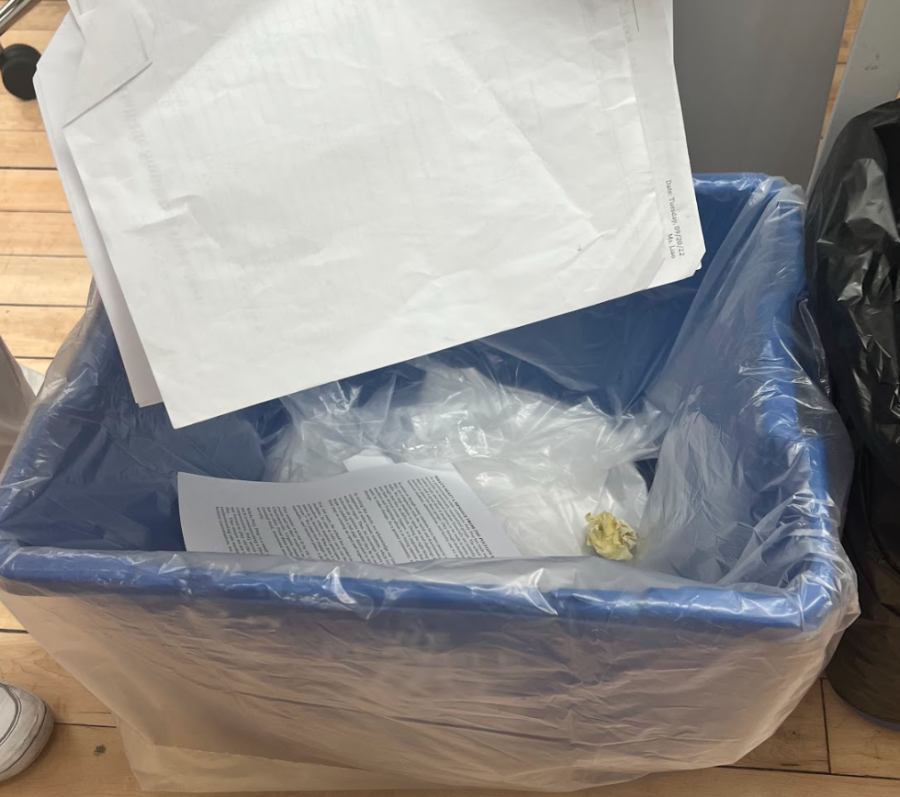How Poly Can Help The Recycling Crisis
January 3, 2023
The United States alone produces 33 percent of the global waste population. According to Grow NYC, New York City residents only recycle about 17 percent of their total waste, leaving 83 percent to be thrown away.
In the past, recycling has been challenging in NYC, especially due to the pandemic. Due to COVID-19, New Yorkers began to order more food to their homes, and many started to clear out their old junk. According to the New York Times, Harry Nespoli, the president of a union representing city sanitation workers, said, “much of the increased waste is home equipment stuff, a bench they have downstairs, the old TVs with the wood around them. They had these things in the basement for 100 years, and they’re putting them out.” As a result of the lockdown many of the garbage collectors were unable to gather the waste and recycling, creating a larger buildup in New York. Additionally, according to NPR reporter Lisa Ramsen, “The crisis just gets worse and worse, and without drastic change will continue to worsen as the industry plans to triple plastic production by 2050.”
At Poly, recycling has been extremely challenging since the pandemic, however, it is also one of the most important aspects of our community. Elijah Sivin, Director of Service Learning, explained, “we were doing it before the pandemic, and I know that when we came back we weren’t doing it. Sanitation had to change all their schedules, and for budget cuts they eliminated composting of food and paper recycling. Now Poly is restoring paper recycling, at least in specific spots in the school.” Moving forward in our community we can start with small actions of recycling, and Poly can help make a change.
I was part of Sivin’s Fall Sustainability Service Learning Team, and we hope to make an impact on Poly and how we as a community can improve our recycling habits. Our main goal is to create a recycling system at Poly to decrease the amount at waste on campus. Throughout the first few weeks of the SLT, students learned about the importance of recycling and the effect it has on our community. The recycling program that we take part in at Poly can be extremely beneficial towards our communities outside of school. Senior Thomas Collier, a student in Sivin’s Fall Service Learning Team, states, “when you recycle it’s all kinda like a chain, if you recycle stuff then it reduces waste because you are converting stuff into things you can use.” If we begin to recycle paper as a community we can reduce the amount of waste in our landfills, as well as the amount of greenhouse gasses being produced. The more students that participate in the newly established recycling program at school, the greater effect it can have on the environment outside of the Poly community.
During the early weeks of the SLT, students learned about the chain of recycling. They read numerous articles that detailed the world’s state if we don’t take action now. By the year 2050 we could be in serious danger, and this is why we need your help. Throughout my experience participating in Sivin’s Service Learning Team we learned about the long term effect on recycling. I believe that If students here at Poly continue to take part in bad recycling habits it could affect other communities in our neighborhood, and beyond, that is why we must continue to recycle at Poly. Additionally, it is also important that students don’t only recycle at school, but in the other communities that they are a part of, including their homes.
The SLT group established a new program that will implement recycling into the students’ everyday life if done correctly. They created two recycling zones on campus that teachers will be able to monitor everyday, creating an organized system. Students can recycle their clean paper materials, excluding glass, in room 103A, which is Sivin’s office, as well as room 105, which is the history department office. Now we need your help! Begin recycling your paper and cardboard materials to help make a change at Poly.


























